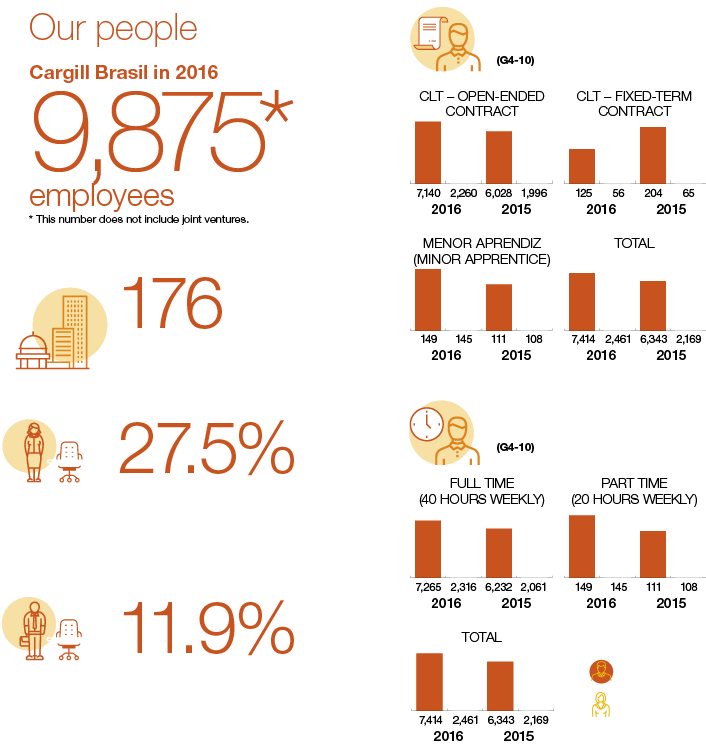Cargill and its professionals
The human development area of Cargill is under construction. That is how we may characterize the profound transformation we have been going through mainly since the middle of 2016. The goal is to value our people, serve our business more efficiently, and as a consequence, achieve our goal of feeding the world responsibly, safely, and sustainably.
TOTAL NUMBER OF EMPLYEES BY REGION(G4-10)
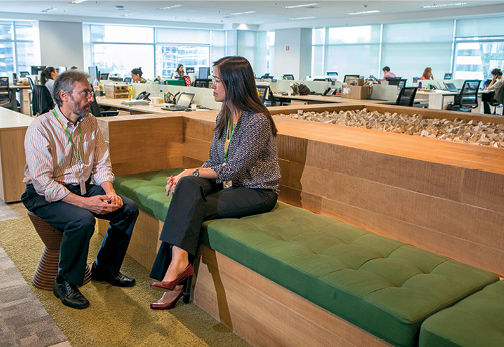
Integrated vision
The change involving human resources activities seeks integrated vision and models of structures, processes, and systems. The result of this work begins to be perceived with the formation of the Health Committee and the Diversity Committee, with the consolidation of the Cargill Business Service (CBS), in Uberlândia (MG), and strategies for attracting and retaining talent. It also manifests itself in our work as signatories of the National Pact for the Eradication of Bonded Labor and in our interest in improving the model of our relationship with Brazilian unions.
Health and safety
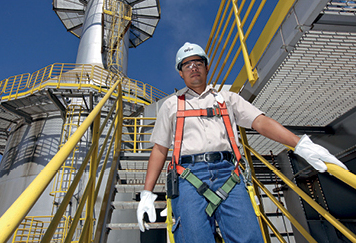
Safety, a non-negotiable value.
Integrated management is also the word of order in health and safety at Cargill. That is why, in 2016, we created the Health Committee, whose main objective is to connect and boost all initiatives related to this aspect in the company, such as the benefits area, outpatient clinics, and prevention campaigns. With a series of actions that are being planned by the Committee in partnership with the Human Resources area, the idea is to create a health promotion and prevention environment, relying on our employees to take responsibility, on the one hand, so they may feel responsible for their own health; on the other, so they may clearly see that the benefit and quality of life programs offered by the company belong to everyone and are a collective good, so that they always make conscious use of them. In 2017, initiatives will be implemented after the creation of the Health Committee.
Safety has always been a priority for Cargill, in Brazil and worldwide. The good news is that in 2016 there were no fatal accidents in the country. The company, however, is not satisfied, and works to achieve zero fatality globally.
In Brazil, new strategies are being developed and represent advances in company culture. These initiatives are based on three pillars:
Each employee's sense of responsibility for safety
More attention to risks, i.e. situations that may be fatal or severe, which may change people's lives indefinitely
Training focused on operational discipline and communication
SIF, an essential indicator
Having consistent metrics is another key safety issue. Therefore, we reviewed existing indicators and adopted one more, the Serious Injury and Fatality Incident (SIF), which helps us identify risks. This is a post-fact indicator, that is, it allows analysis after an incident or evidence of risk. Our goal, and major challenge, is precisely to work preventively and, in this sense, SIF is an extremely important indicator for our business.
We mapped
12
high-risk activities that received special safety.
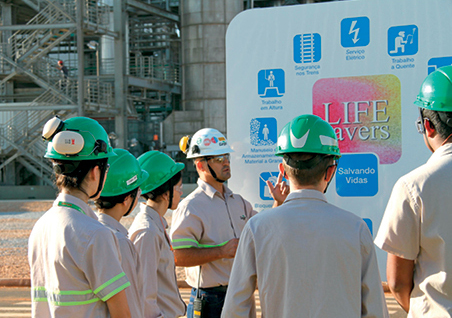
Saving lives
The Program LIFEsavers - Salvando Vidas, implemented in Brazil since 2015, seeks to engage our employees and align concepts and expectations at a global level, to ensure the integrity of those who work with us. The program encourages the adoption of practices that identify risks and help eliminate hazardous situations in 12 high-risk activities. Emphasis is given to the expected behaviors and minimum requirements required to perform tasks safely.
The 12 activities, with their respective risks and hazards, were mapped from an analysis that showed which behaviors most involved fatalities at Cargill worldwide.
Safe Driving Policy
Among the 12 activities highlighted globally by Cargill is traffic safety. This item gained focus in 2016, following Cargill's global plans to achieve zero fatality in its operations. In this context, safe driving is a very important aspect, since the collision of motor vehicles was the main cause of fatalities in our company in the last 13 years.
Based on scientific research that points out the main causes of traffic accidents, we also changed our Safe Driving Policy in 2016, including:

Prohibiting the use of electronic mobile devices, including those using hands-free technology, while our employee is driving on behalf of the company, operating a vehicle owned or leased by the company, except when the vehicle is parked in a safe place
People driving must not use mobile devices to conduct Cargillrelated business while commuting to work, including driving a personal vehicle
Culture of diversity
In 2016, we focused on the subject of diversity and created mechanisms that allowed us to build a vision and integrated conduct on this aspect. Based on information already available and the experiences of the internal networks, such as Women in Operation in Brazil (MOB), Pride (LGBT) and Cargill's own strategic intention, the Brazilian Diversity Committee was structured.
It is a multidisciplinary group with representatives from all areas of the company interested in developing the subject. At the end of 2016, the Committee organized an action plan to coordinate the various initiatives. The first project will be gender-focused, a global focus of Cargill, but all other aspects of diversity will have specific actions. Even more subjective issues, such as the importance of diversity of thought and the unconscious bias of managers in decision-making, are also on the agenda for 2017.
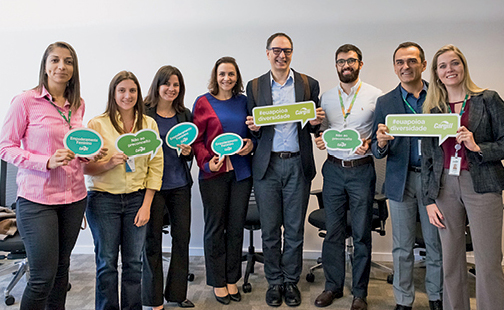
We created the Diversity Committee to prioritize the actions and discussions related to this aspect.
Attracting and retaining talent
Among the main changes experienced by Cargill's Human Resources area, the initiatives that are being designed and implemented regarding the attraction and acquisition of talent deserve special mention.
From June to December 2016, a total of 90% of the positions (500 jobs) made available in Brazil were conducted by our internal recruitment teams. In cases of expansion projects or reorganizing areas or very specific positions, we continue to use the support of external consultants.
We are building a new recruiting model in Brazil, with several benefits:
Contribute knowledge to the human development area of the company
Have an integrated view of the needs of each business and its specifics
Boost internal movements
Reduce the cost involved in processes
Optimize time
Gender issue
The agribusiness market is mostly formed by male professionals. From June to December 2016, Cargill employed 58.6% men, of the total number of employees. For the next year, as one of the Human Resources goals and with the support of the Diversity Committee, the challenge is enormous.
OUR GOALS
30%
of available positions with women finalists in the selection processes conducted by CBS.
50%
of available positions with women finalists in the selection processes for management positions.
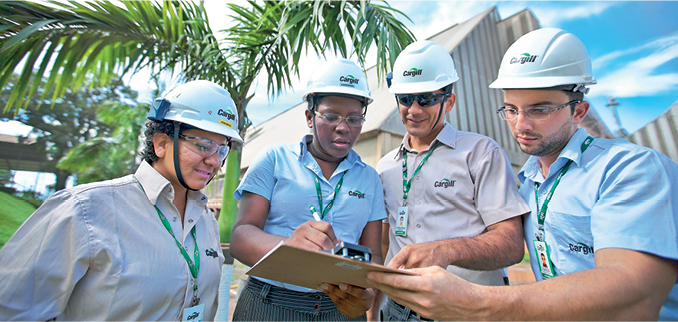
Hand in hand with universities
As part of our purpose to have a company that values differences of thought and knowledge, fundamentally guided by ethics, we commissioned a survey in 2016 to understand how well Cargill is known among students from 200 Brazilian universities.
Based on this analysis, we concluded that future agronomy practitioners, for example, would prefer to work for 14 other companies before choosing Cargill. We also identified that the main reason for our low placement in the three categories evaluated (humanities, engineering, and agronomy) is the little knowledge that this group has of our performance. Our next step will be to propose a relationship program with important universities throughout the country, which will include lectures and working day activities at Cargill, among other initiatives.
We are also revisiting our internship program, for which we created recruitment trails, designed for the specifics of the profiles and the needs of the areas of the company.
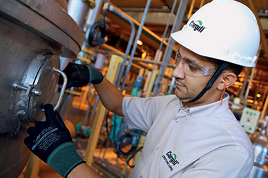

Ethics as part of everyday life
All our employees, upon joining the company, go through an integration program. In this first contact with Cargill, they learn about the company’s Code of Conduct. Outsourced security professionals also receive information about our ethical principles. Cargill has a set of ethical principles, described in the Code of Conduct, which places human rights at the center of the company’s and its employees’ performance.
In addition, training and qualification sessions are organized at all Cargill units to ensure compliance with internal policies and commitments assumed by the company. In 2016, for example, 7 Ally Program training sessions on diversity were carried out, resulting in 182 trained employees, and 3 training sessions on the Program to Combat Sexual Exploitation of Children and Adolescents, organized by the NGO Childhood Brasil, resulting in 3 trained people. (G4-HR2, G4-HR7)
Shared services
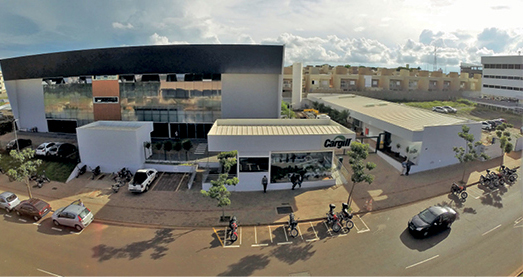
In 2016, we concluded the second wave of the Cargill Business Service (CBS) consolidation project, located in Uberlândia (MG). This is a global trend for Cargill, to focus on financial, accounting, tax, administrative, human resources, information technology, and purchasing activities in a single place.
CBS was inaugurated in 2015 with the objective of bringing gains in operational efficiency, which are already being perceived by our suppliers and clients. To structure CBS, we carried out hundreds of internal professional movements and created about 200 direct jobs in the region, as well as indirect jobs and business opportunities. Today, CBS has 500 employees and makes an important contribution to Cargill’s growth strategy based on the world’s best practices for continuous improvement and shared services.
CBS is an important contribution to our growth strategy.


